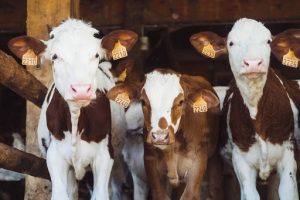Can You Eat Meat On a Plant-Based Diet? The answer is not as obvious as you think.
Plant-Based vs. Vegan
“Plant-based” is often used interchangeably with “vegan”. Thus, you may think that a plant-based diet eliminates all animal products, including meat. However, this is not necessarily true.
A vegan diet, or veganism, is a lifestyle that avoids and condemns all forms of animal exploitation. Veganism is an ideology that promotes animal rights and fights against the commodity status of animals. Thus, a vegan diet strongly excludes all animal foods.
A plant-based diet, while sympathizing with the cruelty of animal farming, focuses on the health benefits of plant based nutrition. It encourages the consumption of plant foods while limiting OR eliminating animal products, such as meat, from your diet.
It is often very difficult to stop consuming familiar foods right away. In fact, 84% of those who are vegan eventually go back to eating meat. Thus, a plant-based approach allows for reductionism – a gradual decrease in the consumption of animal foods.
Consumption of Meat Around the World

Over the past 5 decades, the consumption of meat in the United States, and around the world has increased. The global population has doubled and incomes kept rising, leading to more people craving and being able to buy meat.
The recent rise of environmental movements has highlighted the unsustainability of meat production. The industry came under fire as scientists stressed the dangers of deforestation and large freshwater and energy utilization.
Meat Industry in the U.S.

The US is the largest consumer of meat in the world. Annually, an average American eats approximately 120 kg of meat. In 2016, the meat industry alone accounted for almost 6% of American GDP.
Reports find that the US production of meat has been growing at the rate of 2-3% every year. On the other hand, the consumption of meat has been slowing down.
This slight decline in demand for meat can be associated with many factors. Many scientists have expressed health concerns in regard to meat, particularly red meat.
Another factor is the growing awareness of global warming and the detrimental environmental effects of mass animal farming. These all must be taken into account when asking if you can eat meat on a plant based diet.
Different Types of Meat
There are 4 categories of meat – red and white, as well as organic and processed.
Red Meat
Coming from mammals, red meat is one of the most nutritious and debated foods ever. The consumption of red meat goes back as far as 2 million years. It includes beef, pork, lamb, and other meats that come from mammals.
White Meat
In mainstream media, white meat is often considered healthier than red meat. It includes fish and poultry, such as chicken or turkey, among others. An obvious distinction between white and red meats is the color, with white meat being paler.
Processed Meat
Processed meat is any meat that has been modified for a better taste or increased shelf life. These include hot dogs, sausages, ham, bacon, and others.
In 2015, the World Health Organization (WHO) classified processed meat as a carcinogen, meaning that it can cause cancer.
WHO’s International Agency of Research on Cancer presented strong evidence that linked the consumption of processed meat to colon cancer. Research also found red meat to be associated with some types of cancer but the evidence is limited.
Organic Meat
This type of meat, either red or white, comes from animals who haven’t been fed growth hormones or antibiotics. Usually, organic meat isn’t produced through mass animal farming. Instead, animals are raised in their natural environments and are mostly grass-fed.
Though organic meat can be more expensive, you should consider it for both health and ethical reasons.
Is Meat Bad For You?

There is a link between meat consumption and some diseases. These may include diabetes, cardiovascular disease and cancer.
Meat and Risks of Cancer
Many observational studies have linked animal products, especially meat, to some types of cancer.
Gastric cancers, which are often associated with meat consumption, are the fifth most common type of cancer.
Processed meat has been shown to contribute to the development of gastric cancer. Notably, white meat has been suggested to have the opposite effect. One study found that regardless of how it is cooked, white meat can reduce the risks of gastric cancers.
In 2018, the American Institute for Cancer Research (AICR) released a report on meat, fish, and dairy. The report suggests that there is “convincing” evidence that “consumption of processed meat is a convincing cause of colorectal cancer”.
Apart from the AICR research, many other reports, including WHO, offer evidence that links the consumption of meat to colon cancer. The findings also suggested that cancer risks from red meat are “probable”.
AICR believes this is enough to make a recommendation to the public to limit consumption of red meat. So, if you are wondering whether you can eat meat on a plant based diet, we would probably advise against it.
Meat and Diabetes
Eating meat can also increase your chances of having diabetes.
A 2017 study found people who eat animal protein have a 35% higher risk of having diabetes than those who relied on plant protein. Another research conducted at Harvard came to significant conclusions.
It suggested that eating even a small portion of red meat daily increases the chances of diabetes by 19 percent. Moreover, consuming processed meat, such as a hot dog or 2 slices of bacon raised it to 51 percent.
These risks are associated with heme iron, which is prevalent in meats. There are two types of iron, heme- and non-heme. Heme iron, as you can guess, is found in animal foods. Non-heme iron, on the other hand, is found in plant-based foods, like grains and vegetables.
Heme iron is more easily absorbed than non-heme iron, which is a common critique against vegan or plant-based diets. However, excess heme iron has been proven to increase the risks of diabetes, as well as heart and liver diseases.
Though the human body undoubtedly needs iron, which I will discuss later, it cannot remove excess iron from the organism. Consuming a lot of meat can easily lead to heme-iron overload, which is likely to be detrimental to your health.
Meat and Heart Diseases
Meat consumption has also been linked to cardiovascular disease, heart failure, and early death. One of the reasons is the high level of saturated fats that is prevalent in meats, especially red meat. Another reason is cholesterol, which meat is also rich in.
Red meat has repeatedly been shown to contribute to heart diseases. A report released by the National Institute of Health (NIH) revealed that meat increases levels of Trimethylamine N-oxide (TMAO). This chemical has a strong correlation with cardiovascular diseases.
Though all these studies have been debated and are observational, there is enough evidence to consider reducing meat consumption.
Benefits of Eating Meat on a Plant Based Diet
Despite all the criticism, meat is one of the most nutritious foods ever. It is also a big part of many cultures and families. The process of cooking meat is considered by many to be an activity that brings people together.
Protein
The biggest benefit of eating meat is the large amounts of protein it contains.
The role of protein in your body is crucial. Protein is the building block of all our tissues. There are different types of proteins, each responsible for their own functions.
Enzymes, for example, support biochemical reactions. The contraction of muscles, digestion, energy production, as well as blood clotting, are all dependent on enzymes.
Proteins can also be hormones, which transmit information between the cells and organs. Insulin is a protein-based essential hormone.
Proteins like collagen and keratin aid your skin, hair, bones, and ligaments. They are responsible for the structure and flexibility of all these tissues.
Moreover, protein control acidity levels in your blood and other bodily fluids, thus supporting the proper pH level.
Finally, your immune system also relies on protein. Protein-based antibodies help our bodies fight infections.
All in all, protein is super important and meat has a lot of it. You can safely incorporate lots of plant-based sources of protein into your diet.
Iron
Another important benefit of eating meat is iron. Iron is a mineral that is essential for a healthy body. Iron supports the production of blood in our bodies. Our red blood cells contain 70% of the iron in our body. Meat, and red meat especially, has large amounts of iron.
One of the most important roles iron has is ensuring the flow of oxygen to organs and cells. This is especially important for physical exercises or work that requires a lot of concentration. Iron deficiency causes fatigue, loss of focus, and irritability.
As I’ve mentioned earlier, iron that meat provides is heme iron. It is more easily absorbed than non-heme iron, which is found in plant-based foods. However, there are ways to enhance your body’s Iron absorption when consuming plant-based foods.
For example, you should pair iron-rich foods with products that have Vitamin C. Fortunately, Vitamin C has been proven to aid iron absorption. Thus, if you are wondering whether you can eat meat on a plant based diet, the answer doesn’t need to be yes.
You can successfully get a sufficient intake of iron from plant-based foods, such as legumes, nuts, and vegetables. Moreover, 100 grams of spinach contains more iron than 100 grams of red meat.
Vitamin B Complex
Lastly, meat is a major source of B-complex vitamins, among other nutrients.
There are 8 B vitamins, each essential for our bodies; the list of their roles is quite long. B complex supports cell health, eyesight, brain and nerve functions, and digestive processes.
In addition, these vitamins promote proper levels of energy and appetite, as well as the production of ‘good’ cholesterol and hormones.
Vitamins B are also crucial for healthy aging, especially for men. Vitamin B6, for example, supports the production of testosterone, a sex hormone the production of which naturally decreases over time.
Notably, the B complex is vital for pregnant women. B Complex prevents birth defects and supports the brain development of the fetus.
Dangers of Mass Animal Farming

By now you probably realize that eating meat has both benefits and disadvantages. How do they produce meat today?
Though some meats can be generally good for you, the consequences of mass animal farming are disturbing.
Antibiotics
Growth hormones and antibiotics are fed to the majority of animals in factory farms. The scope of the problem is huge. The meat industry utilizes 70% of all antibiotics produced in the United States.
The regular use of antibiotics can create drug-resistance in bacteria that emerge in farming conditions. Bacteria can easily spread to those employed at the farm, or through the food chains. Drug-resistant bacteria can, unfortunately, end up on your plate.
Waste
In 2012, factory farms produced 369 million tons of manure, 13 times the amount produced by the entire American population.
Many meat factories in the U.S. maintain poor sanitary conditions and lack good waste management systems. Farm workers do not have the luxury of a clean working environment.
This waste emits more than 400 dangerous gases in the air and often destroys the soil. Complex sewer systems process human waste. Animal waste evaporates in open ponds. These ponds are often accompanied by other chemical wastes.
Clearly, this substantially pollutes the air, specifically for the residents in the area. Thus, emissions from animal farms and waste ponds cause many respiratory illnesses. Statistics show that children who are raised near an animal farm are more likely to have asthma or bronchitis.
Viruses
Another global danger of mass animal farming is the likelihood of the emergence of dangerous viruses. Unsanitary conditions and drug-resistance make it very easy for novel viruses to emerge.
Factory farm animals breed at an alarming rate . They also live in very tight quarters. Their genes are very like one another. This also makes it easier for viruses to spread, since the immune systems of all animals are almost identical.
The virus contracts the animal and jumps to a human when they consume meat. These viruses are zoonotic. Notably, 60 percent of all viruses identified by modern scientists today are zoonotic.
Almost all recent epidemics, including H1N1, have emerged from animal farms. COVID-19 originated at a wet market in China, where hundreds of live animals are kept and slaughtered for food.
So, Should You Eat Meat On a Plant-Based Diet?
It depends on your philosophy and motivations.
If your primary reasons for adopting a plant-based diet are ethical, you should avoid meat at all costs.
If you are experimenting with your nutrition for the sake of being healthier, you may continue to eat small amounts of meat while on your plant based diet. Try choosing white meat over red meat, and cutting back on any processed meat.
Nevertheless, replacing meat with plant-based foods should be your long-term goal.
Whatever your reasons are, we wish you luck and patience.










